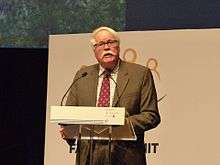Allan C. Carlson
- Allan Carlson redirects here. For those of a similar name, see Allan Carlsson or Allan Karlsson (disambiguation)

Allan C. Carlson (born Des Moines, Iowa, 1949) is a scholar and professor of history at Hillsdale College in Hillsdale, Michigan. He is the president of the Howard Center for Family, Religion and Society, a director of the Family in America Studies Center, the International Secretary of the World Congress of Families[1] and editor of the Family in America newsletter.[2] He is also former president of the Rockford Institute.[3]
Biography
Carlson earned his B. A. from Augustana College and his Ph.D. in European History from The Ohio State University. He served as a member of the Lutheran Council in America's Government Affairs Office from 1975–1978. In 1979, he became a lecturer and assistant-to-the-president at Gettysburg College. He joined The Rockford Institute in 1981, where he remained until he joined with John A. Howard in splitting off from that organization and forming the Howard Center in 1997. He was appointed to the National Commission on Children in 1988 by Ronald Reagan.[4] In 2003, Carlson served on the faculty of Oriel College, Oxford.
His articles and treatises have addressed the underlying causes of population decline, the effects of taxation and regulation on the size and well-being of the family, as well as historical efforts to implement a family wage in the United States. He has observed that the post-World War II baby boom in the United States was largely a "Catholic phenomenon." [5] "[T]he 1945–1964 era produced a 'heroic' flowering of Catholic family life in America. Although fertility rose for all American religious groups, it rose far more rapidly and stayed high longer among Catholics.... The total marital fertility rate for non-Catholics averaged 3.15 children born per woman in the early 1950s and 3.14 in the early 1960s. For Catholics, the respective figures were 3.54 and 4.25."[6]
Carlson has also criticized the impact of feminism on women's roles in society as disastrous and continuing to take its toll on the family.
Bibliography
- Family Questions: Reflections on the American Social Crisis, (Transaction Press, 1988)
- The Swedish Experiment in Family Politics: The Myrdals and the Interwar Population Crisis, (Transaction Press,1990)
- From Cottage to Work Station: The Family's Search for Social Harmony in the Industrial Age, (Ignatius Press, 1993)
- The New Agrarian Mind: The Movement Toward Decentralist Thought in 20th Century America, (Transaction Press, 2000)
- The American Way: Family and Community in the Shaping of the American Identity, (ISI Books, 2003)
- "Wendell Berry and the Twentieth-Century Agrarian 'Series'" – Essay published in Wendell Berry: Life and Work edited by Jason Peters (U. Press of Kentucky, 2007)
- Third Ways: How Bulgarian Greens, Swedish Housewives, and Beer-Swilling Englishmen Created Family-Centered Economies – and Why They Disappeared, (ISI Books, 2007)
- The Natural Family: A Manifesto, (Spence Pub, 2007)
- The Natural Family Where It Belongs: New Agrarian Essays, (Routledge, 2014)
- Family Cycles: Strength, Decline, and Renewal in American Domestic Life, 1630–2000, (Transaction Publishers, 2016)
References
- ↑ World Congress of Families Responds to Attack by Certain Members of European Parliament Archived 2007-04-28 at the Wayback Machine.
- ↑ Dr. Allan C. Carlson Biography Archived 2006-03-03 at the Wayback Machine.
- ↑ Duin, Julia (December 10, 1997). "Rockford Institute chief leaves to form his own think tank". Washington Times. p. A.2.
- ↑ "Ronald Reagan: Appointment of Allan C. Carlson as a Member of the National Commission on Children". Retrieved 28 May 2018.
- ↑ Carlson, Allan. "Why Things Went Wrong: The Decline of the Natural Family" Archived 2012-09-11 at Archive.is. Speech given at the Pope John Center, Dallas, TX, January 31 – February 4, 1994.
- ↑ Carlson, Allan. "The Family Factors", Touchstone, January/February, 2006